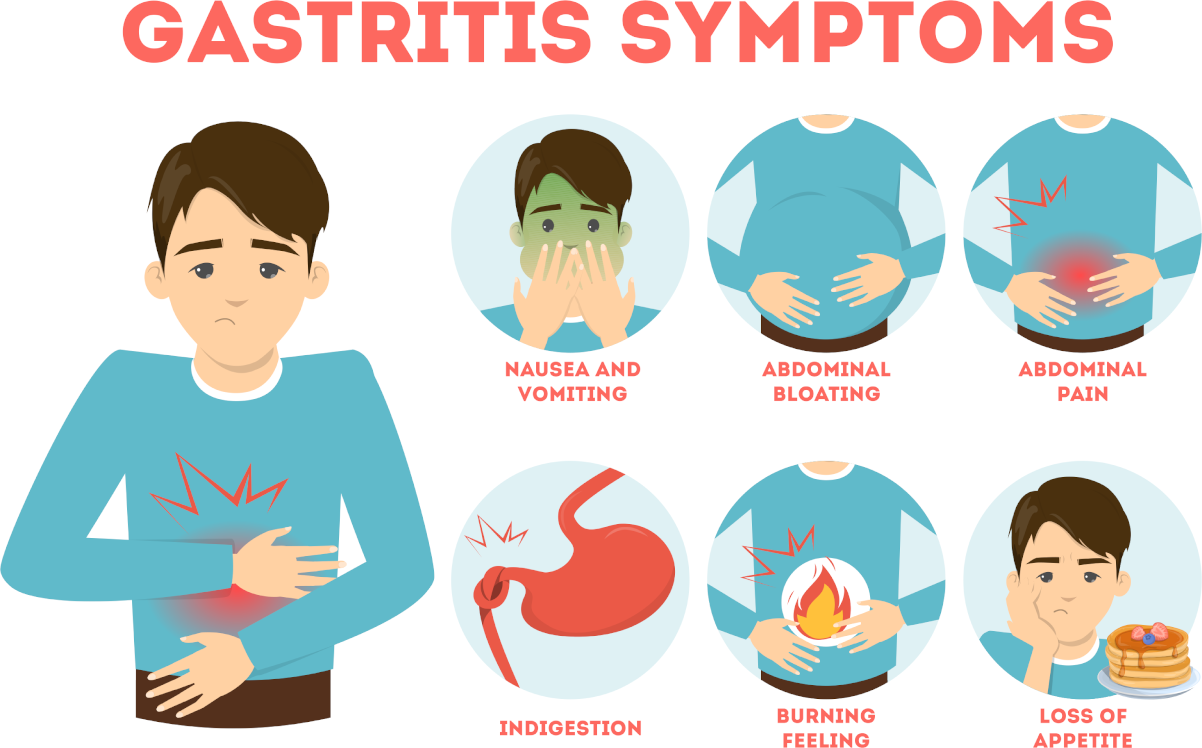
Gastritis is a term describing inflammation of the digestive tract's mucous membrane, most commonly localized in the stomach. Gastritis can arise due to various reasons and manifest in different symptoms. The main causes of gastritis include the Helicobacter pylori bacteria, whose infection in the stomach causes an inflammatory reaction, as well as the long-term use of certain drugs, such as nonsteroidal anti-inflammatory drugs (NSAIDs), which can irritate or even damage the stomach lining. Additionally, gastritis can be caused by alcohol consumption, smoking, regular stress, autoimmune diseases where the body's immune system attacks the stomach lining, or the impact of certain chemicals, such as acids or alkalis.
Symptoms of gastritis can range from mild to severe and include abdominal pain or discomfort, especially in the upper abdominal area, heartburn, nausea, vomiting, abdominal bloating, and even bleeding from the digestive tract, which can manifest as black or tar-colored stools. Some people may also experience general fatigue or loss of appetite.
What are the types of gastritis?
Gastritis is classified into several types, considering various etiological, histological, and clinical aspects. The main types of gastritis are acute gastritis, chronic gastritis, atrophic gastritis, erosive gastritis, and specialized types of gastritis, such as Helicobacter pylori-induced gastritis.
Acute gastritis
This is a sudden inflammation of the stomach lining, most often caused by external irritants. The main causes include the use of certain drugs, such as nonsteroidal anti-inflammatory drugs (NSAIDs) or aspirin, as well as the consumption of strong alcoholic beverages. Acute gastritis can manifest as stomach pain, nausea, and even vomiting. Usually, this condition is temporary and can be cured by removing its cause.
Chronic gastritis
This form is long-lasting and can be caused by various factors, including prolonged Helicobacter pylori infection, autoimmune disorders affecting the stomach lining, or continuous chemical exposure, such as from long-term alcoholism. Chronic gastritis can be symptomatic or asymptomatic, but over time it can increase the risk of cancer in the digestive tract.
Atrophic gastritis
This is a form of chronic gastritis in which the stomach lining becomes thinner (atrophy), resulting in reduced acid and pepsinogen production. Atrophic gastritis can be associated with autoimmune processes or with Helicobacter pylori infection. This type of gastritis is linked to an increased risk of intestinal-type stomach cancer.
Erosive gastritis
This is a form of gastritis where erosions or ulcers are observed in the stomach lining. Erosive gastritis is most often caused by NSAIDs, strong alcohol, or other substances that irritate the stomach lining. This form of gastritis can cause stomach bleeding and manifest as bleeding stools or vomiting.
Helicobacter pylori-induced gastritis
This is a very common form of gastritis caused by Helicobacter pylori infection. This bacteria can survive in the acidic environment of the stomach and can cause an inflammatory reaction. Long-term infection without treatment can lead to chronic gastritis, atrophic gastritis, and even stomach cancer.
Diagnosis of gastritis includes clinical patient assessment, endoscopy with biopsy, as well as Helicobacter pylori tests. Treating gastritis requires considering its cause: treating Helicobacter pylori-induced gastritis with antibiotics, and other forms by regulating acidity, changing lifestyle, and avoiding irritating substances. It is important to note that a proper diet and healthy lifestyle can help control or even prevent some forms of gastritis.

Causes
Gastritis can be caused by various reasons, encompassing both external factors and internal bodily conditions. Understanding these causes is important for both the prevention of gastritis and its effective treatment.
Helicobacter pylori infection is one of the most common causes of gastritis worldwide. Helicobacter pylori is a bacterium that adapts to live in the acidic environment of the stomach and causes inflammation, which over time can lead to ulcers or even stomach cancer. It is transmitted through contaminated food or water, as well as close contact.
Certain medications, especially nonsteroidal anti-inflammatory drugs (NSAIDs), such as ibuprofen and aspirin, can irritate the stomach lining and cause gastritis. Long-term use of these drugs, especially in large doses or in combination with alcohol, increases the risk of gastritis.
Alcohol is a strong irritant of the stomach lining. Regular and excessive consumption of alcohol can cause inflammation and erosions of the lining, thus causing gastritis.
For some people, gastritis occurs due to an autoimmune disorder, where the body's immune system mistakenly attacks and damages the stomach lining. This most often occurs in people with other autoimmune diseases.
Both physical (e.g., severe trauma, surgery, or serious infections) and emotional stress can trigger or worsen the symptoms of gastritis. Stress can promote the secretion of stomach acid and reduce the protection of the lining.
Nicotine can also increase the acidity of the stomach and reduce the lining's ability to regenerate, thus causing or worsening gastritis.
Certain foods and dietary habits, such as spicy food and excessive caffeine consumption, can irritate the stomach lining. Additionally, irregular eating hours and fast food consumption can cause digestive problems, including gastritis.
When bile, normally present in the intestine, flows back into the stomach (reflux), it can irritate the lining and cause gastritis.
Other health problems, such as HIV/AIDS, parasitic infections, and certain viral infections, can also contribute to the development of gastritis.
Given these causes, it is important to emphasize that gastritis prevention includes adhering to healthy dietary principles, avoiding alcohol and smoking, reducing stress, and being cautious with the use of nonsteroidal anti-inflammatory drugs. It is also important to consult a doctor if symptoms arise, especially if they are long-term or severe, to properly identify the cause and start effective treatment.
Symptoms of gastritis
Gastritis can manifest with various symptoms, ranging from mild to very severe. The severity and type of symptoms can vary depending on the cause of gastritis, the patient's age, overall health status, and other factors. Here are the main symptoms of gastritis:
- Upper abdominal pain or discomfort: This is the most common symptom of gastritis. Stomach pain can be burning or pressing and is usually localized in the upper abdominal area.
- Heartburn and belching: During gastritis, increased stomach acid can cause heartburn – an unpleasant sensation or burning in the chest, along with belching.
- Nausea and vomiting: These symptoms can indicate irritation or inflammation of the stomach lining. In some cases, vomiting may contain blood, which indicates a higher degree of lining damage.
- Loss of appetite and weight loss: Due to pain and discomfort associated with food consumption, appetite may decrease, and in the long term, this can lead to weight loss.
- Abdominal bloating and a feeling of heaviness: Abdominal bloating and a feeling of heaviness after eating are two more typical symptoms of gastritis.
- Black or tar-colored stools: This can be a sign of bleeding from the digestive tract, which is a serious symptom and requires urgent medical attention.
- General fatigue: Due to problems with food consumption and the body's energy resources being used for the inflammatory process, general fatigue and weakness may occur.
- Erosions or ulcers of the stomach lining: Although this symptom is not directly felt, it can be detected during endoscopy.
It is important to note that in some cases, gastritis can be asymptomatic, especially in cases of chronic gastritis. This means that the condition can progress unnoticed, sometimes causing more serious complications, such as stomach ulcers or even cancer.
Diagnosing and treating gastritis is very important, not only to consider the symptoms but also to evaluate the patient's medical history, dietary habits, and lifestyle. If you experience one or more of the mentioned symptoms, especially if they are long-term or severe, it is essential to consult a healthcare professional.

Gastritis is a multifactorial condition that can have various health consequences. Early diagnosis and individualized treatment are very important aspects of effective gastritis management and the prevention of complications, such as stomach ulcers or even cancer. Patient education about the importance of a healthy diet and lifestyle is vitally important to prevent the onset and progression of gastritis.
Information sources
- American Gastroenterological Association
- British Society of Gastroenterology
- Gastroenterology
- The Lancet Gastroenterology & Hepatology
# gastritas






